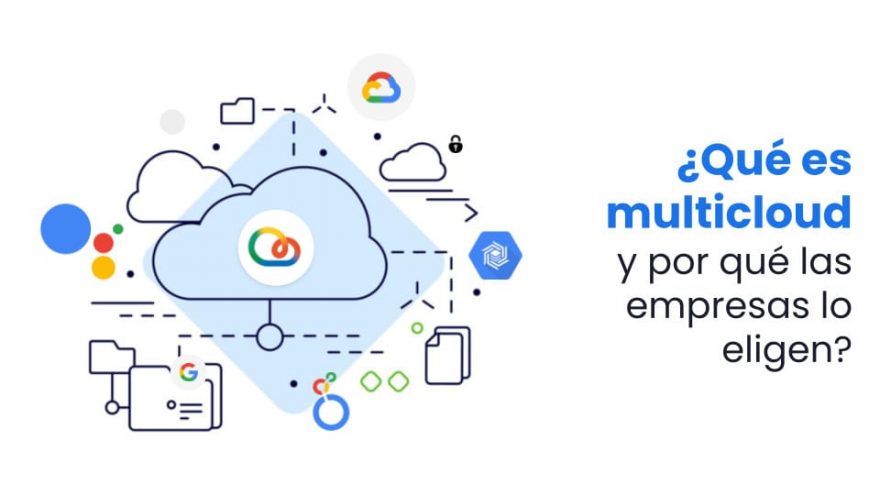In recent years there has been a real tendency for companies to opt for a digital transformation, by digitize and go to cloud environments. However, this trend is no longer limited to having a cloud service contracted from a single provider. Nowadays, more and more companies end up opting for an option multicloud. You do not know what it is? In this post, we will explain What is multicloud and why companies are choosing this option.
Remember that if you are thinking about hire a cloud service, we as a Google Premier Partner, can advise you and help you migrate to the cloud.
1. What is multicloud?
A multicloud It is a solution that combines cloud services from different providers (regardless of whether it is a public cloud or one private cloud) that may or may not be integrated with each other. It must be distinguished from the concept "hybrid cloud" which is limited to combining private and public environments. In the case of multicloud, it goes one step further and allows companies to have more flexibility.
The multicloud environments They offer organizations a series of advantages, such as:
- Flexibility: Organizations can choose the cloud services that best suit your specific needs. For example, they can use a public cloud for applications that require high scalability, and a private cloud for applications that require greater security.
- Costs reduction: Organizations can compare prices and features from different providers to find the best deal. They can also take advantage of promotions and discounts offered by suppliers.
- Resilience: If a cloud provider experiences an outage, organizations can continue operating their applications on other clouds.
2. How does multicloud work?
In a multicloud environment, organizations can use a combination of public, private, or hybrid clouds. Public clouds are provided by third-party providers, such as Google Cloud Platform (GCP), Amazon Web Services (AWS) and Microsoft Azure. Private clouds are owned and operated by the organization. Hybrid clouds combine public and private clouds.
Organizations often use multi-cloud management tools to manage their multi-cloud environments. These tools help organizations automate tasks such as application deployment, resource management, and security.
3. Why is multicloud important?
Multicloud is gaining popularity for several reasons. First, cloud providers are increasingly offering services and functions. This makes it more difficult for organizations to find a single supplier that can satisfy all your needs.
Second, organizations are increasingly concerned about the security and the resilience. Multicloud can help organizations reduce your dependency from a single supplier and improve your disaster recovery capability.
4. How many types of cloud are there?
Originally three main types of cloud computing are distinguished:
- Public cloud: It is provided by a third-party provider, such as Google Cloud Platform (GCP), Amazon Web Services (AWS), or Microsoft Azure. Public clouds offer a wide range of services and features, and are a popular choice for organizations of all sizes.
- Private cloud: is owned and operated by the organization. Private clouds offer greater control and security than public clouds, but they are also more expensive and difficult to implement.
- Hybrid cloud: combines public and private clouds. Hybrid clouds offer the flexibility of the public cloud with the control of the private cloud.
However, in recent years a fourth type of cloud computing has become popular:
- Multicloud: uses cloud computing services from various providers. Multicloud offers organizations a greater flexibility, costs reduction and resilience.
5. Multicloud Management
The multicloud management refers to the process of monitoring and controlling applications, services, and resources across multiple public clouds. As enterprises increasingly adopt hybrid and multi-cloud architectures, multi-cloud management tools play a crucial role in ensuring smooth operation, cost optimization, and compliance across different cloud platforms.
5.1 Challenges of multicloud management
Managing multiple clouds presents several challenges, including:
Lack of visibility: Tracking and monitoring resources across multiple public clouds can be complex and fragmented, making it difficult to get a comprehensive view of your IT infrastructure.
Cost optimization: Attributing costs to specific workloads and applications can be challenging in a multi-cloud environment, leading to inefficient resource utilization and potential overspending.
Safety concerns: Managing security across multiple cloud environments requires careful configuration and consistent policies to ensure data protection and compliance.
Automation and orchestration: Automating tasks and workflows across different cloud platforms can be tedious and inefficient, limiting the agility of IT operations.
5.2 Benefits of multicloud management
Adopting multicloud management solutions offers several benefits:
Centralized control: A single viewport provides unified visibility and control over all cloud resources, simplifying management and troubleshooting.
Cost optimization: Efficient cost allocation and resource optimization strategies help identify and eliminate cost overruns.
Security improvements: Consolidated security policies and centralized cloud threat detection improve overall security posture.
Automation and orchestration: Automation tools simplify repetitive tasks, saving time and improving efficiency.
6. Multicloud Solutions
The best multicloud solution for a particular business will depend on its specific needs and requirements. Companies should carefully evaluate different solutions before making a decision.
Here are some factors to consider when evaluating multicloud solutions:
The number of clouds the company needs to manage: Some solutions are designed to manage workloads on a few clouds, while others can manage workloads on many clouds.
The types of workloads the company needs to manage: Some solutions are better suited for managing containerized workloads, while others are better suited for managing virtual machines.
The company budget: Some solutions are more expensive than others.
The experience of the company's IT staff: Some solutions are more complex to configure and manage than others.
7. What cloud services are there?
Cloud services can be classified into three main categories:
- Infrastructure as a service (IaaS)- Provides organizations with access to computing infrastructure, such as servers, storage, and networks. IaaS services allow organizations to create and host their own applications and services.
- Platform as a Service (PaaS)- Provides organizations with a preconfigured environment to develop, deploy, and run applications. PaaS services simplify application development and management, allowing organizations to focus on business.
- Software as a service (SaaS)- Provides organizations with access to software that runs in the cloud. SaaS services are a way to outsource software, allowing organizations to save costs and reduce complexity.
Cloud services can be further divided into more specific categories. For example, IaaS services include:
- Servers: provides access to virtual or physical servers.
- Storage: provides access to disk storage, tape storage, and object storage.
- Networks: provides access to virtual and physical networks.
PaaS services include:
- Development: provides tools and services for application development.
- Implementation: provides tools and services for application deployment.
- Administration: provides tools and services for application management.
SaaS services include:
- Office automation: provides office applications, such as Microsoft Office or Google Workspace.
- CRM: provides customer relationship management applications, such as Salesforce or SugarCRM.
- ERP: provides enterprise resource planning applications, such as SAP or Oracle.
- Analysis software: provides software for data analysis, such as Tableau or QlikView.
8. How many companies are multicloud?
According to a Gartner study, an 81% of companies already work with two or more clouds (whether public, private or hybrid). However, it is expected that in 2024 the 90% of large companies already use technologies multicloud. These data make the trend towards these technologies more than evident, and show that in a few years few companies will have a single cloud service. This, together with the multiple advantages it offers, means that more and more companies are showing interest in them.
It is for these reasons that since uCloud We are helping all companies that want to move to multicloud to do so, with our advice and methodology for companies. If you want us to help you, enter here and contact us.
9. What advantages does multicloud have?
1. Possibility of benefiting from the advantages of each service
One of the great advantages of using different cloud services is the possibility of benefiting from each of their advantages. For example, in the case of Google Cloud Platform (GCP), you can add unique services to your company such as Kubernetes either firebase. Thus, it is possible to cover all the needs that a company may have.
2. Cost reduction
Another advantage of multicloud is that company costs are significantly reduced by not needing your own infrastructure. In this way, the company has its data in the cloud from various providers. Furthermore, some of the suppliers such as Google offer the possibility of hiring microservices. This allows companies pay only for the service they want and use, which generates great savings in resources that companies often do not use if they contract the entire service.
3. More security
One of the things that is sometimes discussed when using cloud services is whether it is really more secure than physical servers. In this case, multicloud allows security to be maximized since this does not depend on a single service and provider. In this way, companies can benefit from the high safety standards of the different services.
4. More scalable
Related to cost reduction, the possibility of hire only the services that a company needs depending on the workload, it allows this to be much more scalable and that cloud services adapt to the 100% to the company.
5. Workload diversification
Finally, another of the great advantages that multicloud offers is the possibility of diversify workload, so that prevents a single team from taking on a large amount of work. Furthermore, by diversifying the work but working from a unique environment, times are reduced and increases productivity.
10. Do you want to go multicloud?
If you are considering that your company move to multicloud, in uCloud (Google Global Partner) we have cloud services experts that can help and advise your company in migration to the new environment. You can contact us by calling +34 634 88 78 70 or by filling out this Contact Form.




